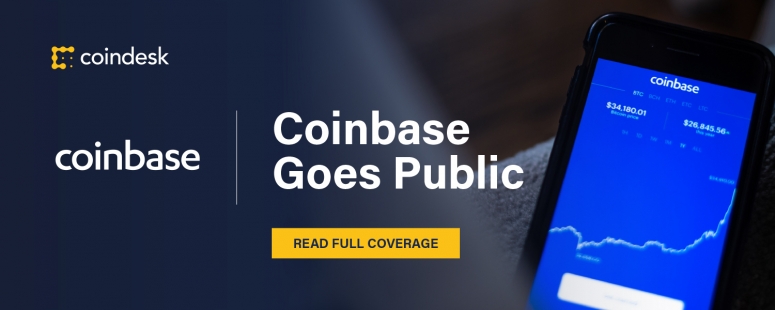Coinbase’s public listing will have an impact on cryptocurrency adoption, regulation and acceptance worldwide, executives at international crypto exchanges told CoinDesk.
The U.S.-based Coinbase began trading shares at $381 on Wednesday, making it the largest direct listing of all time. Exchanges around the world are paying close attention.
“Everyone is watching this IPO – the direct listing precisely. Its implication is more than a pure IPO, but for the first time, a crypto exchange [is] to be listed publicly,” Lennix Lai, Director of Financial Markets at Seychelles-based crypto exchange OKEx told CoinDesk via a written statement.
According to Joel Edgerton, Director of Japan’s largest crypto exchange bitFlyer (with subsidiaries in the U.S. and Europe), bitFlyer sees the Coinbase listing as an early milestone for the crypto industry that will hopefully set a precedent for other countries to accelerate the adoption of crypto globally
“As one of the most widely recognized crypto brands in the West, Coinbase’s IPO underscores a major shift in the global financial infrastructure as more and more people embrace digital assets. We’ve seen this shift accelerate in many of the markets we serve but this moment marks the dawn of mainstream crypto adoption,” Du Jun, co-founder of Huobi group told CoinDesk via a statement.
Since Coinbase financials are now available to the public for analysis, there’s a higher chance of attracting potential investors to crypto, according to Konstantin Anissimov, Executive Director at U.K.-based CEX.IO.
“We’ll see an influx of former bankers, consultants, and entrepreneurs trying to build in this space,” Anissimov told CoinDesk, adding that for bankers and consultants who are usually conservative in their career choices, this assurance will ease the decision to enter the industry.
“Entrepreneurs are often inspired by good stories of creating something larger than themselves. Coinbase, certainly, can serve [as] an example of that,” Anissimov said.
The public listing is sure to attract institutional investors, propelling the entire industry forward, according to Vitaliy Kedyk, Head of Strategy at Belarus-headquartered Currency.com. Digital assets will soon become an important component of every diversified portfolio, just like gold, bonds, and other alternative assets, added Jun.
But, Kedyk added that, moving forward, Coinbase may need to win a battle against decentralized exchanges (DEXes) that allow direct peer-to-peer trading of crypto assets without an intermediary, which are also on the rise.
“Centralized exchanges like Coinbase are in an interesting position. They are bringing awareness to the decentralized economy and acting as a gateway for the general public to enter this new and emerging space. So it will be interesting to see how Coinbase fares against DEXes going forward,” Kedyk said.
Regulation
Huobi’s Jun anticipates that the attention around the Coinbase listing will drive regulators around the globe to get more involved with digital assets, which he believes will benefit the industry.
“A move toward a more standardized and defined regulatory landscape will make it easier for exchanges like ours to provide users with a safe, secure, and reliable trading experience and ensure the industry’s long-term sustainability,” Jun said.
Lai from OKEx added that the institutional acceptance conveyed through this public listing means a lot to regulators, and it could be a good reference for other countries in allowing crypto exchanges to be listed on their exchanges like Hong Kong Stock Exchange, Singapore Exchange, and Börse Frankfurt.
“This is a qualitative shift, demonstrating acceptance of a crypto player in the traditional finance territory. Big validation point!” Anissimov said.
Anissimov also believes that because Coinbase will now be subject to public scrutiny, it will set new “standards of behavior” for other aspiring industry participants, which also may also wish to go public one day.
“Given the standards publicly traded companies are held to, the higher standards will transpire to the crypto industry at large,” Anissimov said.
First of many
Other crypto exchanges are indeed looking to follow in Coinbase’s footsteps.
Kris Marszalek, Chief Executive Officer of Crypto.com – which is headquartered in Switzerland but has offices in Hong Kong and Singapore – said he is watching Coinbase’s market debut closely, as it will provide a reference point for Crypto.com’s own valuation as the first publicly traded comparable.
“For reference, while Coinbase has approximately 5 [times] more users than Crypto.com, we are growing faster and are looking to largely close this gap in the next 18-24 months,” Marszalek said.
A lot of exchanges on the market could potentially be listed on local stock exchanges, like Bithump in South Korea, bitFlyer in Japan, Kraken in Europe, or Bitrrex and OKCoin in the U.S. Lai said, adding that Huobi or his own firm OKEx could get onto Asia Pacific exchanges like in HKEX (Hong Kong) or SGX (Singapore).
“However, there should be standards in place similar to those applied to Coinbase, especially on the listing requirements, the audit statements, and everything related to crypto exchanges,” Lai said.
Lai assumes the next crypto exchange that goes public would be in the U.S. because Coinbase’s example has already been set.
“So, I think moving forward other exchanges would consider investing in the US first, and then other global markets,” Lai said.

 coindesk.com
coindesk.com
